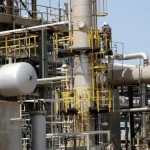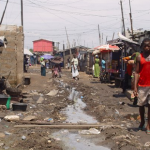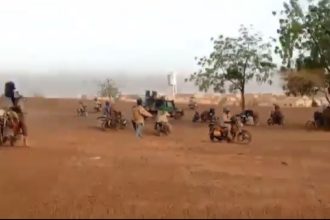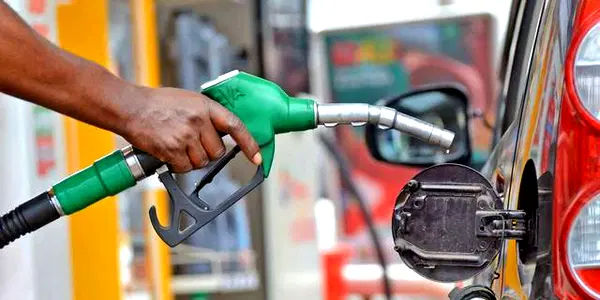The Deputy Minister of Food and Agriculture, Yaw Frimpong, has said that the government has deployed security personnel to the country’s border towns to halt the export of food produce to avert any looming food crisis.
According to him, the ministry let down its guard last year, leading to the export of farm produce to some neighbouring countries, a situation, which has contributed to the current food shortage and price hikes.
He said, “We lowered a guard a bit. We felt that we had enough, so our neighbouring countries kept transporting our food products across the borders. Before we could say jack, we were running into a shortage.”
“So, as we did not protect the little that we had, on our blind side, we allowed these things to go until we got to know that these things must stop, and the minister put a stop to it,” he added.
The Deputy Agric Minister, however, noted that with the expectation of improved harvest in both minor and major seasons in the southern sector, “we will guard them jealously.”
“The most important thing is that we have stopped the exportation of our food products across the borders, and the security agencies around the borders are in the known,” he explained.
Mr Frimpong, also indicated that the national food buffer stock company (NAFCO), has been positioned to mop up every food commodity that would be produced, and this would help avert any food shortage.
On the issue of price hikes, he attributed the situation to a number of factors, including the impact of the Covid-19, which he said had affected the production and supply of fertilisers.
In addition, he said the government experienced some revenue shortfall, which resulted in some fertiliser suppliers not being paid, thereby, affecting agriculture production in the country.
He further attributed the challenge to the drought that occurred in the second half of last year, which resulted in lower production levels, compared to the previous year.
Mr Frimpong underscored that food security was a national security issue, as such, it was the responsibility of every Ghanaian to play its part to ensure the availability and affordability of food at all times.
He spoke on Joy FM on Tuesday, September 14.
On the same issue, the Chief Executive Officer of the Chamber of Agriculture, Anthony Morrison, said, the country risked experiencing some challenges in its food system in the early part of next year (2022).
Accordingly, he said, there would be the need to import more, and urged the government to ensure that when this year’s produce are ready, “a mop-up strategy is provided to store enough food across the country.”
READ ALSO: Ghana Is Facing Food Security Threat – Research Firm Esoko Warns
Former president, John Mahama raises concern over food shortage
Former president, John Dramani Mahama, raised concern over a possible food shortage in the country during his thank-you tour in the Bono Region and said the government had failed to fund the Planting for Food and Jobs (PFJ) programme.
This, he said, had led to the high cost of food prices, and made reference to a farmer, saying, “I have a brother who is into farming, and he tells me the government is yet to supply farmers with fertiliser this year, and so he had to buy it himself.”
“The cost is very high, which has forced him to reduce the acres he is planting from 300 to 80, and the effects of this are that there could be famine in Ghana next year because the planting for food and jobs has failed,” he added.
The former president called on the government to increase its funding allocation to the PFJ programme to ensure its sustenance and avoid any food shortage.
Adding to this, the General Secretary of the National Democratic Congress (NDC), Johnson Asiedu Nketiah, said, “there is maize shortage and that has affected poultry farmers and others areas. If we don’t pray for things to improve, there will be food footage in the country.
“The quantity of food has gone down and prices have gone up. Poultry farmers are selling their birds and that is the reality on the ground,” Asiedu Nketiah claimed.
Agric minister responds to concerns
Responding to this, the Food and Agriculture Minister, Dr Owusu Afriyie Akoto, contended that the country was experiencing bumper harvest and even exporting to neighbouring countries due to sustained investment in the sector.
He said that the PFJ programme had rather made Ghana became the hub of food supply in the West African subregion.
“In fact in 2017, a total of 81,193 tons of food items including maize, yam, rice, plantain and soya bean were exported to neighbouring countries.” Dr Akoto emphasised.
Nonetheless, the Head of Programmes and Advocacy of Peasant Farmers Association, Charles Nyaaba, hinted that the hike in food prices witnessed this year would worsen next year, if some structural issues within the agric sector were not addressed.
“This year, we have had serious challenges with fertiliser, especially in the Northern Part of the country. You know, in the North, the land is not fertile, so if you farm without applying fertiliser, the likelihood of recording very low yield is very high.”
“I must admit that in the last few years, the government has been doing well with supplying fertiliser, but this year the situation has been worse. As a result, many farmers can’t get fertilisers to apply,” he said.
















